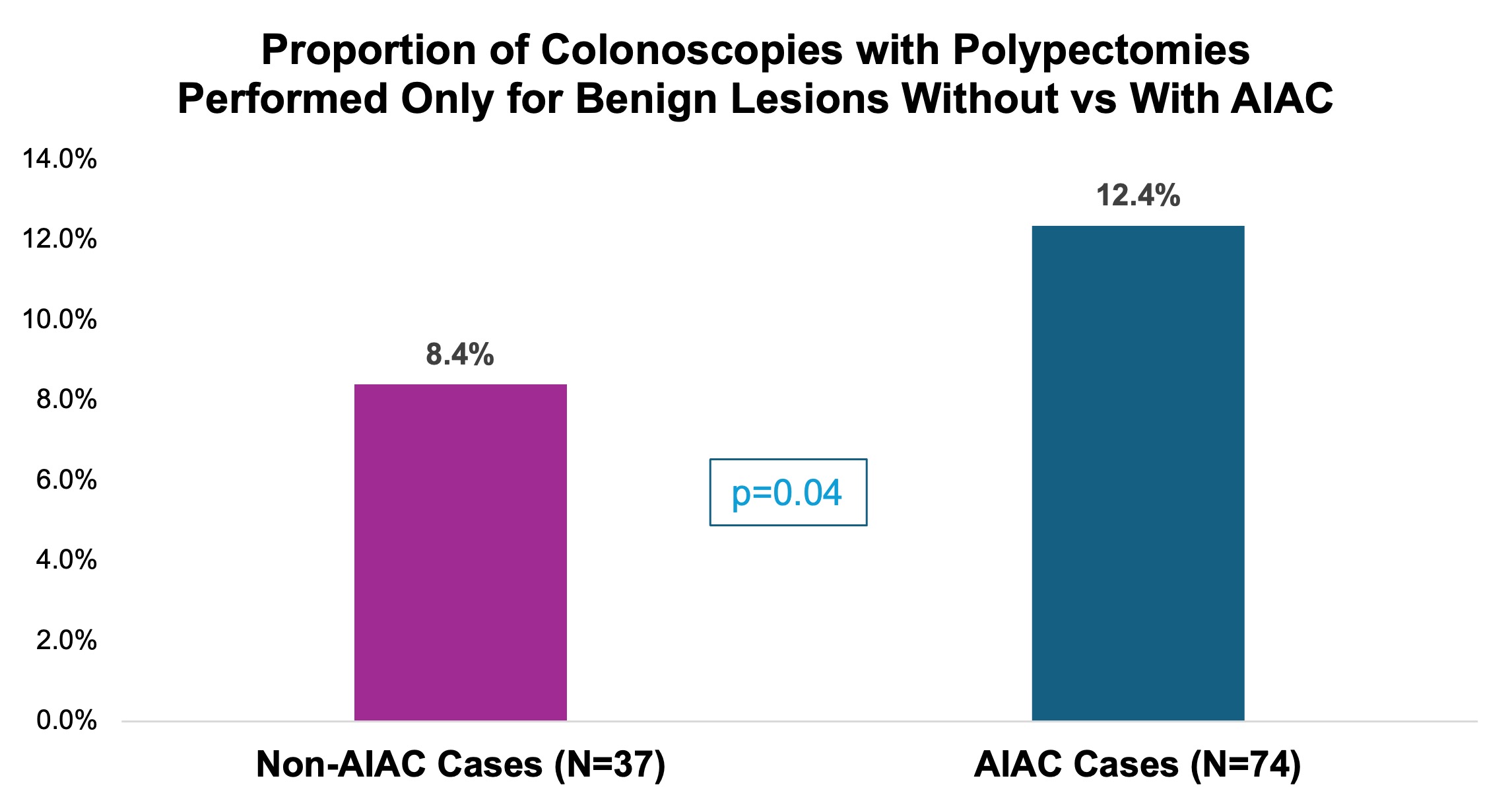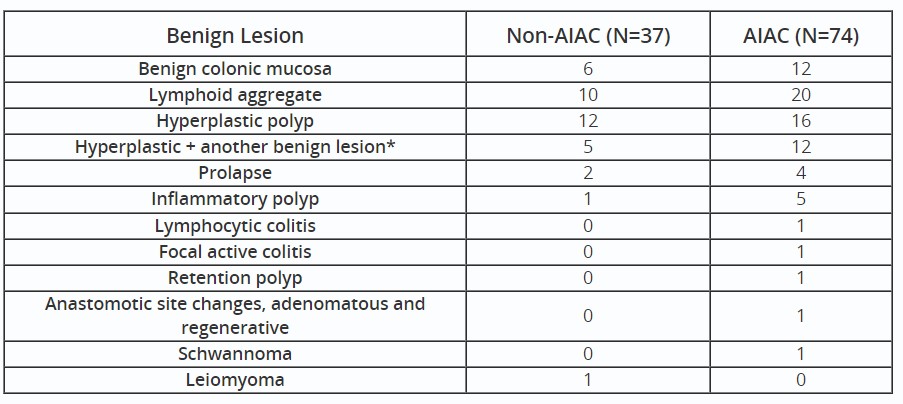Oral Paper Presentation
Annual Scientific Meeting
Session: Plenary Session 1A: Colorectal Cancer Prevention
12 - Artificial Intelligence-Assisted Colonoscopy Is Associated With Higher Conversions From Screening to Therapeutic Exams
Monday, October 28, 2024
2:25 PM - 2:35 PM ET
Location: Terrace Ballroom 1

Tessa Herman, MD (she/her/hers)
University of Minnesota and Minneapolis VA Health Care System
Minneapolis, MN
Presenting Author(s)
Tessa Herman, MD1, Daniela Guerrero Vinsard, MD1, Morgan Freeman, MD2, Amy Gravely, MA3, Anders Westanmo, PharmD, MBA3, Mohammad Bilal, MD1, Brian Hanson, MD3
1University of Minnesota and Minneapolis VA Health Care System, Minneapolis, MN; 2University of Minnesota, Minneapolis, MN; 3Minneapolis VA Health Care System, Minneapolis, MN
Introduction: Artificial intelligence-assisted colonoscopy (AIAC) with computer-aided detection (CADe) technology improves polyp detection during colonoscopy and has been shown to improve adenoma detection rate (ADR). But CADe has also been associated with higher detection rates of non-neoplastic lesions in numerous randomized controlled trials. The rate at which screening, surveillance, and fecal immunochemical test (FIT) positive colonoscopies become therapeutic procedures exclusively for resection of benign lesions without adenoma removal is unknown.
Methods: Using data collected during a single center AIAC implementation trial evaluating the impact of AIAC on ADR compared to a historical cohort of non-AI assisted colonoscopy, we performed an ad-hoc analysis to explore the proportion of colonoscopies done for screening, surveillance, and FIT-positive tests that resulted in resection of exclusively benign lesions in the non-AIAC and AIAC cohorts. Statistical significance was determined using chi-square analysis.
Results: There were 441 non-AIAC (November 2022-April 2023) and 599 AIAC colonoscopies (May-October 2023). Cohorts were balanced without statistically significant difference in patient demographics, endoscopists, AI technology used, procedure time, or mean polyps detected. 37 cases (8.4%) in the non-AIAC cohort had polypectomies performed that solely revealed benign lesions, compared to 74 cases (12.4%) in the AIAC cohort (p=0.04) (Figure 1). Characterization of these lesions are described in Table 1. Benign colonic mucosa, lymphoid aggregates, and hyperplastic polyps were the most common lesions resected.
Discussion: Our analysis revealed that AIAC led to a statistically and clinically significant increase in the proportion of exams where only benign lesions were removed without additional adenomatous polyp removal. In other words, 12.4% versus 8.4% of exams that were intended for colorectal cancer (CRC) prevention became therapeutic procedures for removal of only non-adenomatous lesions with AIAC. This has implications for patients and payors without additional benefit in CRC prevention as well as potential complications from unnecessary interventions. An emphasis on development of hybrid CADe and computer-aided diagnosis (CADx) systems could mitigate future concerns of excessive benign lesion resection with AIAC.


Disclosures:
Tessa Herman, MD1, Daniela Guerrero Vinsard, MD1, Morgan Freeman, MD2, Amy Gravely, MA3, Anders Westanmo, PharmD, MBA3, Mohammad Bilal, MD1, Brian Hanson, MD3, 12, Artificial Intelligence-Assisted Colonoscopy Is Associated With Higher Conversions From Screening to Therapeutic Exams, ACG 2024 Annual Scientific Meeting Abstracts. Philadelphia, PA: American College of Gastroenterology.
1University of Minnesota and Minneapolis VA Health Care System, Minneapolis, MN; 2University of Minnesota, Minneapolis, MN; 3Minneapolis VA Health Care System, Minneapolis, MN
Introduction: Artificial intelligence-assisted colonoscopy (AIAC) with computer-aided detection (CADe) technology improves polyp detection during colonoscopy and has been shown to improve adenoma detection rate (ADR). But CADe has also been associated with higher detection rates of non-neoplastic lesions in numerous randomized controlled trials. The rate at which screening, surveillance, and fecal immunochemical test (FIT) positive colonoscopies become therapeutic procedures exclusively for resection of benign lesions without adenoma removal is unknown.
Methods: Using data collected during a single center AIAC implementation trial evaluating the impact of AIAC on ADR compared to a historical cohort of non-AI assisted colonoscopy, we performed an ad-hoc analysis to explore the proportion of colonoscopies done for screening, surveillance, and FIT-positive tests that resulted in resection of exclusively benign lesions in the non-AIAC and AIAC cohorts. Statistical significance was determined using chi-square analysis.
Results: There were 441 non-AIAC (November 2022-April 2023) and 599 AIAC colonoscopies (May-October 2023). Cohorts were balanced without statistically significant difference in patient demographics, endoscopists, AI technology used, procedure time, or mean polyps detected. 37 cases (8.4%) in the non-AIAC cohort had polypectomies performed that solely revealed benign lesions, compared to 74 cases (12.4%) in the AIAC cohort (p=0.04) (Figure 1). Characterization of these lesions are described in Table 1. Benign colonic mucosa, lymphoid aggregates, and hyperplastic polyps were the most common lesions resected.
Discussion: Our analysis revealed that AIAC led to a statistically and clinically significant increase in the proportion of exams where only benign lesions were removed without additional adenomatous polyp removal. In other words, 12.4% versus 8.4% of exams that were intended for colorectal cancer (CRC) prevention became therapeutic procedures for removal of only non-adenomatous lesions with AIAC. This has implications for patients and payors without additional benefit in CRC prevention as well as potential complications from unnecessary interventions. An emphasis on development of hybrid CADe and computer-aided diagnosis (CADx) systems could mitigate future concerns of excessive benign lesion resection with AIAC.

Figure: Figure 1: Proportion of Colonoscopies with Polypectomies Performed Only for Benign Lesions Without versus With Artificial Intelligence-Assisted Colonoscopy – Artificial intelligence-assisted colonoscopy (AIAC) had a statistically significant higher resection rate of benign lesions without other adenomatous polyp removal relative to non-AIAC exams at 12.4% versus 8.4%, respectively.

Table: Table 1: Characterization of Resected Benign Lesions– Higher resection of benign lesions was seen with artificial intelligence-assisted colonoscopy (AIAC). Benign colonic mucosa, hyperplastic polyps, and lymphoid aggregates were the most common benign lesions that were resected in both cohorts.
*Other benign lesions included benign mucosa (N=1), inflammatory polyp (N=1), lymphoid aggregate (N=3) in the non-AIAC cohort and benign mucosa (N=1), inflammatory polyp (N=2), lymphoid aggregate (N=8), and prolapse (N=1) in the AIAC cohort.
*Other benign lesions included benign mucosa (N=1), inflammatory polyp (N=1), lymphoid aggregate (N=3) in the non-AIAC cohort and benign mucosa (N=1), inflammatory polyp (N=2), lymphoid aggregate (N=8), and prolapse (N=1) in the AIAC cohort.
Disclosures:
Tessa Herman indicated no relevant financial relationships.
Daniela Guerrero Vinsard indicated no relevant financial relationships.
Morgan Freeman indicated no relevant financial relationships.
Amy Gravely indicated no relevant financial relationships.
Anders Westanmo indicated no relevant financial relationships.
Mohammad Bilal: Boston Scientific – Consultant. Cook endoscopy – Speakers Bureau.
Brian Hanson: Motus GI – Consultant.
Tessa Herman, MD1, Daniela Guerrero Vinsard, MD1, Morgan Freeman, MD2, Amy Gravely, MA3, Anders Westanmo, PharmD, MBA3, Mohammad Bilal, MD1, Brian Hanson, MD3, 12, Artificial Intelligence-Assisted Colonoscopy Is Associated With Higher Conversions From Screening to Therapeutic Exams, ACG 2024 Annual Scientific Meeting Abstracts. Philadelphia, PA: American College of Gastroenterology.

